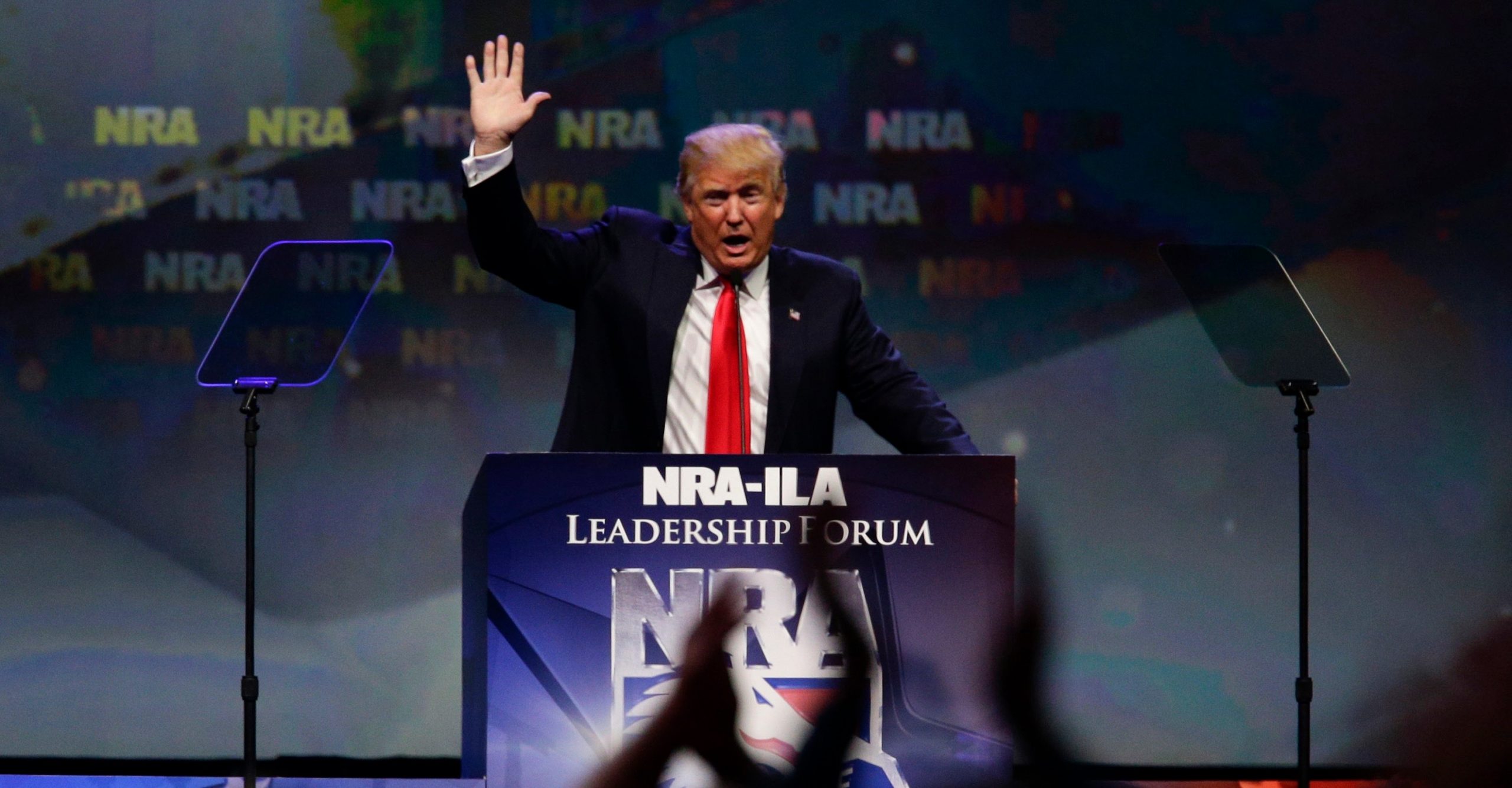Hello, readers. One state is taking steps to stop gun traffickers. Credit card companies are rumored to consider their own means for cutting gun crime. A murmur over the weekend has been confirmed: President Donald Trump is headed back to the National Rifle Association convention, even as scrutiny of the group’s Russia ties increases. Those stories and more in your Monday roundup.
Receive this daily news briefing by email every morning. Sign up here.
WHAT TO KNOW TODAY
The White House has confirmed that President Trump will speak at the NRA convention on Friday. Vice President Mike Pence was already scheduled to appear at the annual event. Per Secret Service rules, guns will be banned during both speeches. Trump was the first sitting president in more than three decades to address an NRA convention when he spoke at its 2017 gathering shortly after the NRA launched a “counter-resistance” in his defense. This year, Trump’s appearance will come just two months after he briefly endorsed aggressive gun restrictions in the wake of the Parkland shooting — only to then walk back his position following a private meeting with NRA leaders.
Also this week: Trump has invited survivors of the Sutherland Springs church shooting to the White House to mark the National Day of Prayer. Five members, including the pastor of the First Baptist Church of Sutherland Springs and his wife, will attend the prayer service on Thursday. In November, 26 members of First Baptist were killed by a gunman who entered the church while they were worshiping.
Credit card companies are considering ways they might monitor gun purchases. That’s according to sources familiar with the discussions who gave the Wall Street Journal the details for its scoop. One of the proposals, which remain preliminary, would be to develop a credit-card code for gun sellers, like those that exist for department stores and restaurants. The Journal says the “move could be a prelude to restricting transactions.” Gun-rights proponents will surely push back against any effort to track firearm sales; gun-reform proponents say that banks already keep tabs on loads of data in order to prevent crime. The idea is the latest in financial companies’ post-Parkland re-examination of their relationship with the gun industry.
There were at least three domestic-violence murder-suicides this weekend. In Martin County, Florida, on Friday night, a 53-year-old woman called police, reporting that her husband had a gun and was going to kill her. The police dispatcher heard shots fired while the woman was still on the phone. In Houston on Sunday, a man fatally shot his wife while she was in the shower before turning the gun on himself. Their four children were in the apartment at the time, and one was injured by a bullet that pierced a wall. Later on Sunday, a woman and two men were found shot to death in a home in western Michigan. Police believe the shooter is one of the dead, and that the incident stemmed from “something stressed” between family members.
In another lawsuit targeting Florida’s pre-emption law, Broward County wants the state to repeal penalties for local officials who enact their own gun rules.The filing asks the courts to rule such sanctions — which include removal from office and fines of up to $5,000 — unconstitutional, as well as declare that local municipalities have the right to legislate on a handful of gun policies, including bans on high-capacity magazine and waiting-period purchase requirements. The suit is separate from one joined by 13 other Florida counties seeking the authority to pass their own gun laws.
A new documentary tracks the uphill legislative battle surmounted by the creators of the modern gun background check system. The short film, produced by a partnership between the New York Times and Retro Report, features footage from congressional hearings, including testimony from the former White House press secretary James Brady, who was disabled by a gunshot wound sustained during an assassination attempt against President Ronald Reagan. A companion article delves into the years it took for the namesake Brady Bill to make its way through congressional and interest-group opposition before it was eventually signed into law by President Bill Clinton in 1993.
NEW FROM THE TRACE
Maryland officials are launching an aggressive campaign against the gun traffickers who police say are operating in cities across the state, The Trace’s Brian Freskos reports. Last week, Republican Governor Larry Hogan approved two measures designed to penetrate the underground networks for illegal weapons. One of the provisions grants investigators broader wiretapping authority so they can seek court orders to eavesdrop on telephone conversations involving suspected gun traffickers. The other sets aside nearly $2 million to create a statewide task force whose chief aims would include investigating straw purchasing and the movement of illegal firearms.
The passage of the provisions, which were spun off from a larger anti-crime package that stalled in Annapolis, reflects the urgent need to tame the violence that pushed homicides in Baltimore up 62 percent last year. It also signals a growing desire among law enforcement to go after high-level traffickers. Prosecutors told Brian that they hope to use their new wiretapping powers to build cases against black-market suppliers and curtail the influx of illegal guns from other states. Read his report here.

